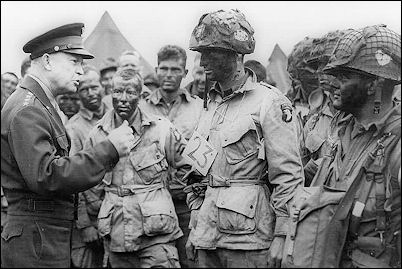What can we learn from Eisenhower’s leadership as the Supreme Commander of SHAEF?
Motto - Eisenhower had a favorite motto that he kept inscribed on a stone on his Presidential desk, but also fits his leadership in World War II - “Suaviter in modo, fortiter in re” (attributed to Claudio Aqua) “ - Gently in Manner – Strongly in Deed”
Optimism – Optimism (and pessimism) were infectious and spread rapidly, according to Eisenhower, especially coming from the position of a commander of men. Victory is unattainable without optimism, and Eisenhower strove to display such optimism in public, and “that any pessimism and discouragement I meet ever feel would be reserved for my pillow.”
Teamwork – In Overlord, Eisenhower developed a strong team of subordinates and carefully listened to their suggestions before going through with a plan. Even until the final minutes of ordering Overlord into action, Eisenhower consulted with his subordinates for the invasion (from different countries) before making the difficult decision to proceed with the invasion. Not every commander in SHAEF agreed with all aspects of the operation, but Eisenhower was able get everyone behind him through consensus and logic in his decisions.
Example – The best leaders dive in, roll up their sleeves, and lead by example. The hours that the staff of SHAEF kept were painful – but Eisenhower matched them. He would only ask his staff to do what he himself would do. Eisenhower himself put it very concretely - "The art of leadership is deciding what to do, and then getting men to want to do it."
Modesty – Although he was a man of considerable talent and power (in Europe and eventually in the White House), Eisenhower did not flaunt or abuse his status. He was able to connect with all – the difficult personalities of Montgomery and Patton, the confident assistants like Bradley, and the foot soldiers, the men he cared for and was concerned for the most.
 Ike spent time with the paratroopers of the 101st Airborne the day before their jump, told stories from home, shared a smoke, and became “one of the boys” if only for a short time. Perhaps the best sign of Ike’s modesty? His handwritten note taking full blame for the possible failure of the invasion, prepared before the first paratroopers left England.
Ike spent time with the paratroopers of the 101st Airborne the day before their jump, told stories from home, shared a smoke, and became “one of the boys” if only for a short time. Perhaps the best sign of Ike’s modesty? His handwritten note taking full blame for the possible failure of the invasion, prepared before the first paratroopers left England. 
Admiral Sir Andrew Cunningham may have said it best about Eisenhower as the Supreme Commander. Speaking with Ike about the difficulty of successfully leading such a vast operation and combining men with different ideas and approaches, Cunningham stated “I do not believe that any other man than yourself could have done it.”
As I travel to England and France, I will be looking for more information and perspective about Eisenhower and his leadership during the Overlord Invasion and the war in general. I hope to bring along a biography of Ike to reference more examples of his leadership as well. I know there is a planned memorial for Eisenhower near the Department of Education building along the Mall at Washington D.C. – a must see once it is completed!

No comments:
Post a Comment